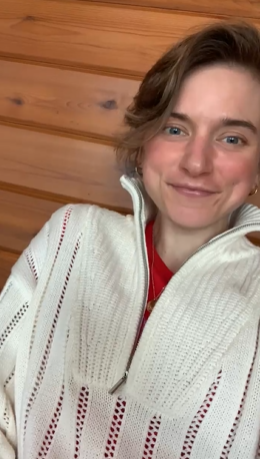
OnlineMedEd became my main study resource for Step 1
OnlineMedEd Helped Me Pass Step 1
Kayla Fay Keane
Hi! My name is Kayla Fay, and I am a third-year student at the University of Michigan Medical School (UMMS), Class of 2026. I plan to apply to a family medicine residency program and eventually practice rural medicine with a focus on women’s health.
I have been a strong advocate (AdvoCat? No pun intended), of OnlineMedEd (OME) since my first year of medical school – before I honestly knew anything about Step 1. I used OME to pass both the didactic component of medical school, which at UMMS is condensed into the first year, and clinical component, which is the second year. Most students then use dedicated Step 1 study time at the beginning of the third year, which was my course of action, as well. By this time, though, I was over a year removed from any didactics on basic science material, which is the emphasis of Step 1. And thus began the struggle…
The Approach
Before I even started studying for Step 1, I oriented myself with the test content and familiarized myself with study plans, schedules, and resources others had used to pass. My study resources initially included UWorld, First Aid, Anki, and NBME Practice Exams, chosen because this is what the forums said were necessary, and, for me, the resources I could afford. I then created a daily study schedule using excel. I am not a granular person, so my schedule wasn’t hour-by-hour, but I stuck to a consistent schedule and took weekly practice exams. Every day, I’d spend 8-10 hours studying.
The Struggle (i.e.: Take 1)
I was doing everything the forums said would lead me to success: Anki, First Aid, UWorld, NBME, and repeat…unfortunately, it came down to two weeks before my scheduled test date, and I still hadn’t scored above 60% on an NBME practice exam. Even worse? My scores hadn’t even improved; they’d actually gotten worse. I. was. STRESSED!
Gaining Insights
As medical students, we are fairly resilient, though, so I sent an (albeit, panicked) email to my school learning specialist who immediately scheduled a video call with me.
Her first question was, “What are your flagged areas of weakness on the NBME practice exams?” Flagged areas of weakness? What is she talking about? I thought to myself. She guided me to the NBME Self-Assessment Insights Tool, which provides individualized feedback on your practice exams. The most helpful feedback is under the “Exam Results” tab, where it flags your weakest content that has the highest yield on the exam. By this, I mean, if you incorrectly answer all the biostatistics questions but biostats is only 4% of the exam, it won’t flag biostats, but it will flag endocrinology because that makes up 16% of the exam and is worth spending more time to study.
The New Approach - Featuring OnlineMedEd (i.e.: Take 2)
After discovering Insights, we discussed the study style that works for me. I admitted that UWorld was overwhelming because I had forgotten many basic science concepts from year one, that despite reading and annotating First Aid, I couldn’t retain the information, and that Anki was time consuming, as I repeated the same cards over and over until I perfected them.
She asked me what had worked for me in the past, and I immediately thought of OME. I remember watching Dr. Williams explain and make sense of concepts not even my lecturers or attendings could. From this, OME actually became my main study resource for Step 1.
Using data from Insights, I’d select a flagged topic, for example, endocrinology. I then spent 3-4 days going through all the OME content on endocrinology and complemented this with blocks of UWorld that only included questions on Endocrinology.
I was truthfully hesitant to use OME at first because I wasn’t sure the information would be detailed or advanced enough to pass Step 1. With just OME and UWorld, though, my score quite literally increased 10 points in just one week. I was also more excited to study because I was finally learning. Dr. Williams explains things in a conversational tone that helped me stay engaged and provides clinical correlations so that learning basic science mechanisms begins to have more meaning.
Time for Step 2…without a doubt, I will be using OME.


